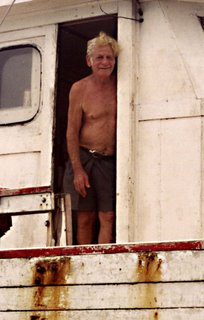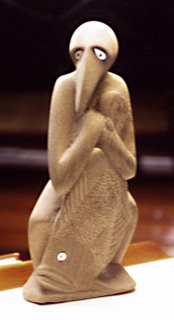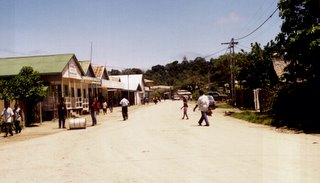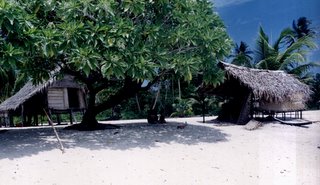September 24, 2003-Tony the Greek
 Tony TonyWe first ran into Tony when he stuck his face out the pilot house door of an ancient islander trader in Gizo, Solomon Islands. We were sitting alongside his vessel in our dingy giving one of his crewmen a ration about dumping oil in the bay. "What'sa problem?" he asked disdainfully. "You're dumping oil into the harbor!" I said, as I eyed the slick leading out from his boat towards Wings, anchored across the bay. "So whats'sa matter, we're pumping dah bilge, you always get a little diesel when'a you pumpa dah bilge. It'sa only diesel! What's you wanta me to do?" This exchange went nowhere for another minute or so and then we motored off in our dingy, convinced that "Tony" would pump his bilges as long as he felt like it, and would, in fact, pump the whole Arabian peninsula into the sea if he could, and never worry a smidgen about the consequences. Two nights later I saw him in the bar at the Gizo Hotel ordering a couple of beers and I decided to make peace with the man. I went up to him, introduced myself, shook his hand and said I hoped there weren't any hard feelings about what I said the previous occasion. "No, I no giva it another thought." He said. We talked for a while and I observed the man. Old and deeply wrinkled, he had a face full of warts and beady blue eyes buried deep under a thick brow. He had a big WC Fields nose, and a mop of unruly white hair. Wearing a dirty red short sleeve shirt which stretched over a small round stomach and dirty white shorts, he was altogether an unpleasant looking fellow, quite intimidating when I'd been looking up at him on the deck of his ship, not so intimidating now in the bar at the Gizo Hotel. But he was an interesting man, a white man in a black country, the kind of mysterious expatriate you meet on a dusty street in a remote part of the world, where most other people you meet talk pigeon and call you "boss", and you wonder how he got there. I decided Tony was a loner, an expat who's gone bush long ago, working on native boats with native crews for native owners, driving old rotting wooden ships around the islands for as long as anyone can remember. Maybe no one around here knows his story, I sure don't, but he has one you can be sure, something in his past or personal make-up that resulted in his choice of a life on the edge of the world. As we talked Tony warned me about the natives, said never to trust them, they'd steal you blind, and told me not to leave our boat un-attended. I guessed Tony had learned these lessons the hard way. I wondered about his background and I asked him if he was Italian and he said, "No, Greek." I asked him if he was the captain of the ship and he said, "No", and indicated a Solomon Islander sitting alone at a table nearby, saying he was the captain. Then he said, "Don'ta look, He'sa gonna think we're talking about him." We walked over to the table and there was a lot of shaking of hands and I sat down and talked to both men, but I didn't understand much of what they said, and less of what was really going on, and I never figured out exactly what their relationship was, but it definitely included some rivalry and mutual suspicion. Maybe Tony was there to keep the ship from being wrecked, but the other man, for political reasons, was officially the captain, but that was never clear. They each cornered me alone however and said they'd come to WINGS the next day to explain the whole situation, to tell me the real story; but the next morning their boat was gone from the harbor, and both of them with it. I don't know when I'll meet Tony the Greek again, but somehow I know I will. I'll see his ship, and there he will be, in some other hot, dusty, remote town in this forgotten part of the world. Meanwhile, I know he's out here, doing his thing, and he will be until he dies, probably some moldy jungle hospital somewhere, alone. Fred & Judy, SV WINGS, Solomon Islands Labels: crew, Gizo, Solomon Islands
September 18, 2003-The Solomon Islands-A New Country-A New Time
 Solomon Islands Stone Carving Solomon Islands Stone CarvingWe left Papua New Guinea after a stay of two and a half months. The Lousiades were great, and we could have spent more weeks there and still not seen it all, but it was time to go. The anchorages and islands of the Solomons were enticing and the clock was ticking towards January when we would be heading north across the equator. If we were going to see anything in the Solomons, we needed to move on. At dawn on the 13th of September we weighed anchor in the Budi Budi atoll and set sail to the North East. The passage was uneventful, close hauled sailing in light to moderate winds, and WINGS performed as only she can, steering finely on the wind vane and making great time to windward. We arrived at Gizo, 8 degrees 6 minutes S. 156 degrees, 50.3 minutes E. at 1:30 the next day, three hours ahead of schedule, having sailed 202 miles in 31 hours. We hoisted a Solomons Islands courtesy flag and the yellow quarantine flag and had a cool drink. We'd arrived in a new country, for a new adventure. (We've visited the Solomons before, if briefly, in 2002, when we sailed in the Santa Cruz Islands, which are part of the Solomons, for a week.) Before long we were on the dusty streets of Gizo, taking in the sights and marching to the Customs office. The place is fascinating, as is every new place to us, packed with black Solomon Islanders and brown Gilbertese, the Micronesians who have been settled here in years past, and a few, very few, white people, mostly expat Americans, except for three very lonely and bored Australian police sent here as part of the Australian led intervention force. They don't have much to do. The stores, mostly run by Chinese, are of the "general store" type, which you might expect to have seen in 1920's.  Gizo GizoThere are a few private cars and trucks, and eleven of the most beat-up taxi's you can imagine. But they don't have to be very good to attain the maximum speed of 5 miles per hour, which is as fast as you can go on the street crowded with people and full of potholes 8 inches deep. There are however, about 500 panga type speedboats and much of the transportation here is by water. (The airport is on an island; you take a water taxi to and from it). Parking spots for cars on the street are easy to find, but parking on the waterfront for boats is at a premium. Gizo is the tourist center for the Solomons, but for the last few years that isn't saying too much. There has been a "time of tensions" in the whole country, marked by violent clashes, crime, and a breakdown of government function. The Solomons have been reputed to be a dangerous place visit. There used to be 200 yachts a year stopping in Gizo, now there are less then 10, and mostly those are just passing through. The economy has been in tatters. But it is a new time for the Solomon Islands. An international force of military and police, led by the Australians have landed, rounded up some of the worst bandits and killers and have restored order. They are also in the process of rounding up a bunch of really corrupt politicians. Many people think that Australia will have to virtually take over the country before they are done. Some other countries in the region are concerned by this, knowing that their own houses are not in order, but in the Solomons, it seems to be a welcome change. In Gizo, people are hopeful. Maybe tourism is coming back. The dive shop has been busy and there are now three yachts anchored in the harbor. People are upbeat. There is new construction going on. We are excited by the cruising potential here. With no cruising boats here for several years, the place is relatively untouched and there are hundreds and hundreds of promising anchorages to try. We'll be reporting to you about whatever we find in the Solomons, and if you are looking for an unspoiled hideaway, you'd better book now. This place could take off. Fred & Judy Labels: Gizo, Solomon Islands
September 14, 2003-Night Passage to Budi Budi
 An island near the equator, white sand beach, two miles long, maybe, backed by palm trees and jungle foliage, and through the gaps, the blue ocean beyond. There are thatched huts on the beach, and we can hear the children laughing and playing in the sea. Where we are anchored, one half mile offshore, but within the protection of the reef and lagoon, there is calm azure blue water and a mild trade wind breeze blowing though our hatches. Nice, very nice. This is Budi Budi, 9 degress 17 minutes South, 153 degrees, 41 minutes East, the farthest outpost of Papua New Guinea. We arrived here this morning after a night passage from Misima having left the port of Bwagaoia at 5:00 pm the night before. Dusk found us beating around the eastern corner of Misima Island, and then we bore off and settled down for the long reach up to Budi Budi, 100 miles distant. With the wind vane steering, and a nice steady breeze, there wasn't much to do on our three hour watches except wait for the moon to come up, and when it did, we had light. A good sail. At dawn we felt our way into the lagoon at Budi Budi and dropped anchor off the village. Several canoes came out while we were anchoring, and several naked boys on foam boogie boards paddled up, and after we anchored one man introduced himself as William. "Hello" I said as I leaned over the side to shake his hand, "Nice to meet you. Can we stay here?" "Yes", he answered. I told him we wanted to eat and get some rest. He said, "OK", and they all disappeared. We had the day to ourselves and we napped and swam off the boat in warm, crystal clear water. In the distance we could hear the surf pounding on the far side of the island. Tomorrow we'll go ashore on Budi Budi.  MV Muyuwa, Local vessel returns from Woodlark Island, 40 miles distant. MV Muyuwa, Local vessel returns from Woodlark Island, 40 miles distant.Fred & Judy, SV WINGS, Papua New Guinea Labels: Budi Budi, Gizo, Papua New Guinea, sailing, Solomon Islands
September 10, 2003-Misma
wingssail images-fredrick roswold
 Bwagoia Town, Misma Island, The Louisiades Bwagoia Town, Misma Island, The Louisiades
The big town in these parts is Bwagaoia Town on Misima Island. Most people just call the town Misima, dispensing with Bwagoia name altogether, but if you want to say Bwagoia, you say it "Baw Gaw Wah". Bwagoia is the customs and immigration clearance port mainly because of the substantial gold mine there, the operation of which results in a lot of traffic in and out of the country. But since it is a clearance port it is convenient for the yachts which come to Papua New Guinea to visit the Lousiades to clear in and out here. Actually, without the availability of Misima most yachts wouldn't come Papua New Guinea at all, or they would do it without checking in because there is no other port anywhere near. Going to one of the mainland ports, besides exposing yourself to a crime problem, means you'd have to beat upwind in the trade wind belt to get to the Lousiades, or if you stayed and cruised the mainland, then you'd have a beat back to Australia. Neither choice is to inviting to most cruising yachts. Anyhow, Misima makes the Lousiades possible for us.
The other side of the coin is that without the requirement to check in and out at Misima, most yachts wouldn't bother coming there either. They’d just bring what they expected to need from Australia, and when the food ran out they’d go back.
We, on the other hand, rather liked Misima despite the fact that it's pretty much a dreary place and the weather is generally bad and most of what we needed to buy wasn't available anyhow. But there are several stores there and we did find a lot of what we wanted. We restocked provisions with what we could, buying rice and flour and canned tuna, etc, the normal stuff you find in these island stores, plus beer and liquor. But the treat was fresh bread. We visited the bakery nearly every day for some small loaves which looked and tasted like out favorite "bollios" from Mexico.
Bwagoia itself is a few dozen buildings on a flat, dusty, piece of ground next to the brown water of an inlet on the east end of Misima Island. There are three beat up piers next to town usually with a few equally beat up island traders tied to them. The yachts anchor a 100 yards off, and dingy to shore. When you walk into town from the wharf you find it full of Papua New Guineans, mostly chewing Betel Nut and watching the white people. There is a produce market, where you can buy Betel, and sometimes some other produce, and there they laugh when you speak to them. There are some roads out of town and some businesses on them, but right in town there are two large Korean owned, general stores, with certain canned goods like tuna and spam, dry goods, a cooler for pop and butter and eggs, and a freezer for a small selection of frozen meats and a smattering of fresh produce. But you could also get bikes, a little hardware, clothing, batteries, film (although I never saw a camera), pots and pans, electronics, and probably a lot more that we never really looked into. For my part, I needed a new watch, having foolishly broken my last one trying to dry it out after snorkeling with it once too often. (Too bad too, because it had five alarms which I used to remind me of the five weather fax times every day). Well, anyhow, I needed a new one, which was impossible if I was looking for an exact replacement, but I did find some alarm watches for about $7. I bought two.
Plus there is the bakery, a couple of smaller general stores, three liquor stores, (but we only found two of them) a fuel depot, and a couple of second clothing stores.
Up the hill there are the government offices, a hotel (called a guest house) a hospital, the communications station with a massive satellite dish, the high school, a satellite TV company, a car repair shop. I think you get the idea. We took some walks around town, mostly on the dusty roads, or we hung out at the hotel where you could get a cold beer.
That’s Misima.
Click here to see all the photos From the Louisiades
Fred & Judy, SV Wings, Misma, The Louisiades
Labels: Louisiades, Papua New Guinea
September 10, 2003-Fast Trip to Bwagoia
wingssail images-fredrick roswold
 Sunset Bwagoia Harbor, The Louisiades Sunset Bwagoia Harbor, The Louisiades
We got the anchor up at 08:45 and set sail inside the reef for One Pass East in a nice 15 knot SE wind and calm seas. It was downwind and we sailed with just the main. We put out the fishing lines but we didn't catch anything. After an hour of sailing we jibed around a reef which was a waypoint and then we set the jib. As it would do, the wind immediately came up to 20 knots, but it was still easy sailing, and still no fish.
At 11:10 we went out through the pass, One Pass East, which is not named on any chart but it is one pass east of our favorite anchorage so we gave it that name, and by then the wind was up into the mid twenties and solid. The pass itself was easy, flat calm and good visibility, and in fact I enjoyed it thoroughly with all the colors of the water and sandbars and islands. Right outside the pass however we saw some pretty huge standing waves and we headed up into the wind a bit where they seemed less, but still we got into some really good waves. Once out of the rough stuff we bore off to Bwagaoia, 20 miles distant. The wind was still strong, and the waves still plenty big enough to soak us once in a while, but it was, again, easy sailing, and we made good time. Two hours and twenty minutes later we sailed into Bwagaoia Harbor, having averaged 8.4 knots across from the pass on a beam reach, and anchored just off the town wharf.
A good fast trip, but no luck fishing this time.
Click here to see all the photos From the Louisiades
Fred & Judy, SV Wings, Bwagoia
Labels: Louisiades, Papua New Guinea
September 9, 2003-Wind Bullet Alley
To our way of thinking Pana Wina is its own special version of hell; what are we doing back here?
Well, we are on the way to Misima, and Pana Wina is a half way point, and some friends are here, and we agreed to meet them, so we stopped. But we knew it was a mistake as soon as we rounded the corner into the bay. When the first gust hit us it caught us head to wind and set the sails flapping and it seemed like all hell broke loose, and this was the anchorage. The wind whips through this anchorage like little cyclones about once every 10-20 seconds, or if you are lucky, they give you a minute or two before blasting. I don't know how strong they are, our instruments are not reliable right now and besides, the gusts are too short for the averaging, but if it's blowing 20 outside, it must be 30 or more here in the gusts.
We sailed in with a full main and the number 4 jib; not much sail but for Pana Wina's gusts, it was too much. In the lulls we stood straight up and stopped. In the gusts we were knocked over to our beam ends, meaning down so far it was hard to hang on. Oh, I guess I thought it was exciting, but who needs it. Dropping and folding the sails was also exciting. Needless to say we worked fast. Judy is dynamite on the foredeck when she needs to be.
So we arrived here and anchored, in 40 feet of water in good sand, away from the coral patches and bommies, made the boat secure, and it’s time to go visit our friends. We're fine here, but we hate it. Hata Lawi was much better.
Fred & Judy, SV Wings, Pana Wina, Lousiades, Papua New Guinea
Labels: Louisiades, Papua New Guinea
NEXT Page (More)
, or... GO BACK to Previous Page
|
 Tony
Tony
 Solomon Islands Stone Carving
Solomon Islands Stone Carving Gizo
Gizo
 MV Muyuwa, Local vessel returns from Woodlark Island, 40 miles distant.
MV Muyuwa, Local vessel returns from Woodlark Island, 40 miles distant. Bwagoia Town, Misma Island, The Louisiades
Bwagoia Town, Misma Island, The Louisiades Sunset Bwagoia Harbor, The Louisiades
Sunset Bwagoia Harbor, The Louisiades.jpg)
